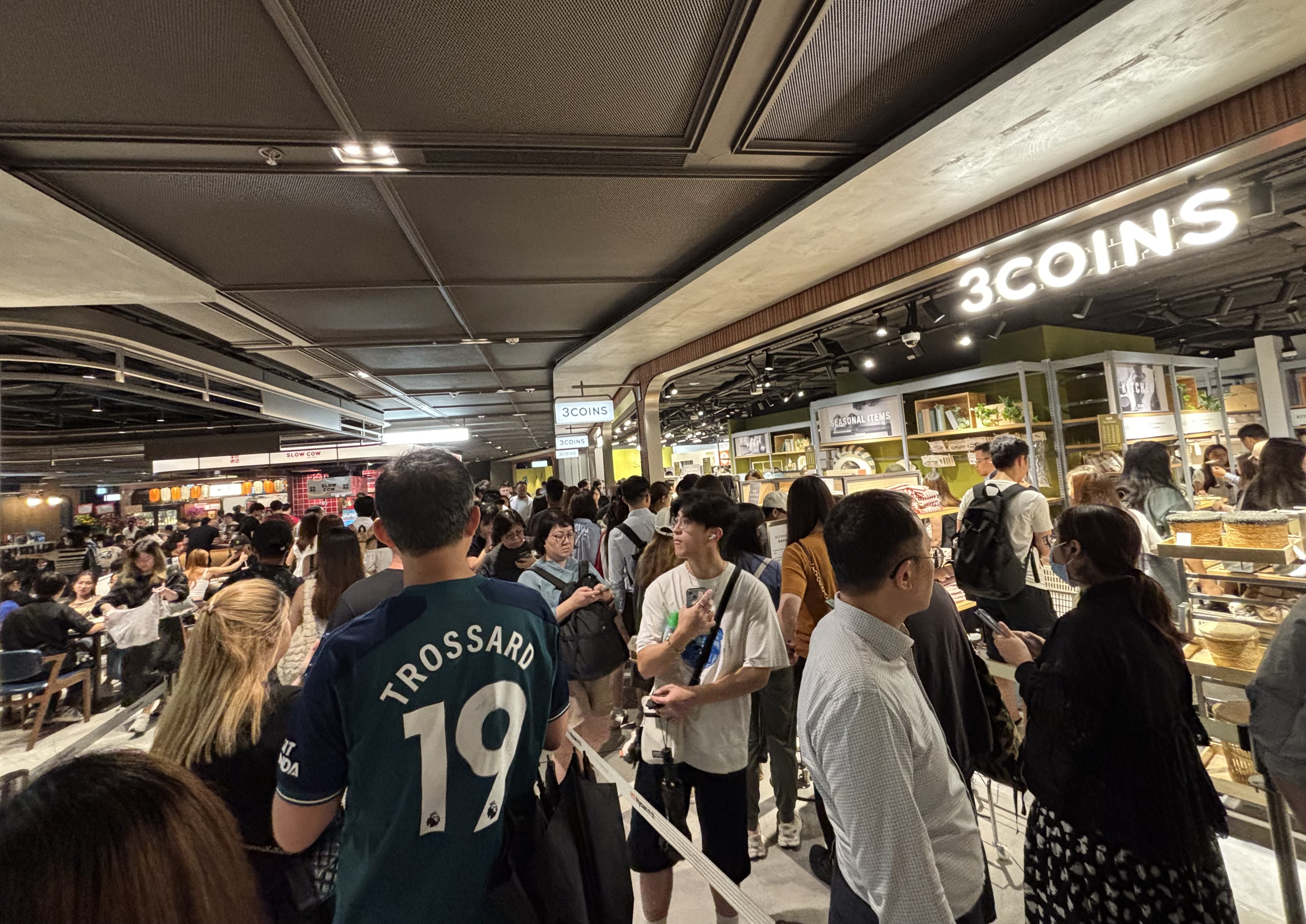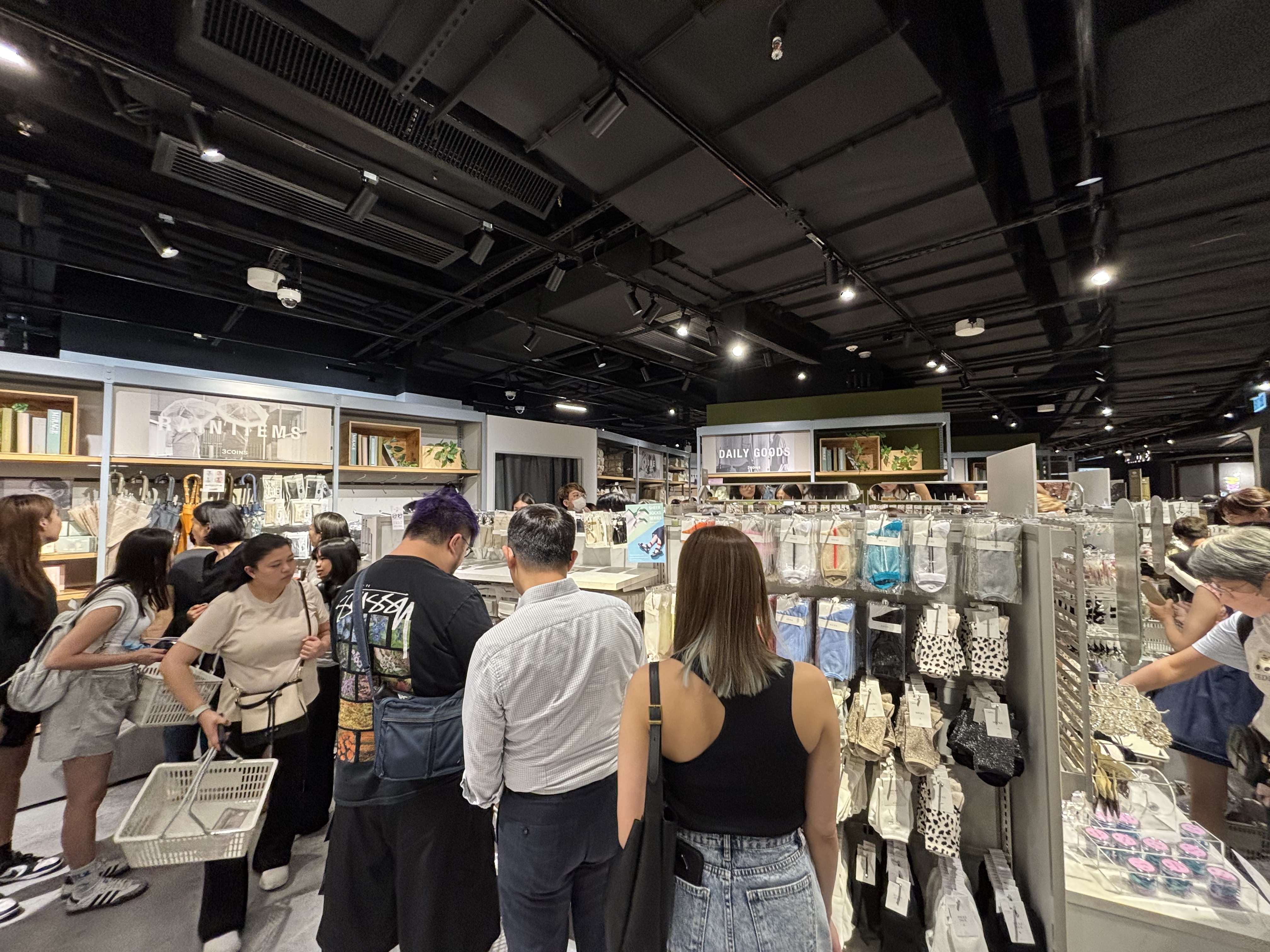
On a workday evening, more than 100 people — mostly young adults and families — swarmed the basement level of a shopping mall in bustling Causeway Bay, lining up to check out a new store.
Long lines are typical outside luxury stores in Hong Kong because they limit the number of customers inside to enhance the shopping experience. However, this time, it’s a budget-friendly store, and it was packed with shoppers inside.
Covering 2,600 square feet (242 square meters), the newly opened Japanese lifestyle-goods store 3Coins is stocked with its signature affordable products, including household items, outdoor gear, and accessories, all priced from HK$18 ($2.29) to HK$228.
The brand said it reported record-breaking sales on July 18, the opening day of its Hong Kong branch — its first overseas flagship store. It marked the highest single-day sales in the chain’s history since its founding in 1994.
ALSO READ: Chan: Overseas firms in Hong Kong more secure under the NSL
The popularity of the Causeway Bay shop isn’t an isolated case. Budget-friendly retail stores have been gaining traction among local consumers, sprouting up rapidly into prime, high-rent locations across the city that used to be dominated by high-price brands.
T.momo Shopping Mall, a local bargain grocery chain that started in Sham Shui Po three years ago, last week opened its 14th branch at Sai Wan in the Central and Western district. Meanwhile, Chinese mainland budget retailer Miniso recently has launched a two-story flagship in the heart of Causeway Bay.
The transformation of the special administrative region’s retail landscape is, in fact, a natural reshuffling driven by shifting market demand, and it reflects evolving spending patterns among both local consumers and tourists, analysts said.

Lawrence Wan Wan-keung, senior director of advisory and transaction services in retail at CBRE Hong Kong, saw the trend as an opportunity for Hong Kong’s retail market to “start again” and move toward a more diverse and healthier landscape, as opposed to the past, when luxury and high-price retailers could be seen everywhere along core shopping streets.
Rent reductions have also given emerging brands an opportunity to establish themselves in prime retail streets and core districts, he added.
A report by Cushman & Wakefield revealed that high street retail rents in Hong Kong generally declined in the second quarter because of vacancy pressure, with Causeway Bay seeing a drop by 3.6 percent quarter-on-quarter, followed by Tsim Sha Tsui and Mong Kok at 3.4 percent and 1.7 percent respectively.
READ MORE: SAR a ‘showroom’ for mainland brands
The shift in demand also reflects people have been more prudent about their spending in recent years amid a sluggish global economy clouded by geopolitical uncertainties.
Hong Kong’s retail sales had been declining for 14 months until May, with provisional values of retail sales reaching HK$31.3 billion, up 2.4 percent compared to the same month in 2024, according to the Census and Statistics Department. Sales across several sectors saw gains, including supermarkets, medicines and cosmetics, and food, alcoholic drinks, and tobacco. However, sales of jewelry, watches and clocks, and valuable gifts dropped 3.2 percent, and footwear, related products, and other clothing accessories declined by 0.1 percent.
Wan said that beyond necessities, spending on nonessential items like clothing and electronic gadgets is often driven by impulse, which is closely tied to consumer sentiment.
READ MORE: JD targets Kai Bo to revamp retail market
Regarding luxury sales, tourists’ spending preferences — particularly those of mainland visitors who traditionally drove demand for luxury goods — are shifting because of a less-favorable renminbi-Hong Kong dollar exchange rate and their online shopping habits, said Barrie Chan Chak-ming, senior director and head of retail at Savills Hong Kong.
Chan said these changes could serve as a catalyst for landlords and retailers to rethink their strategies for regaining competitiveness, such as introducing trending brands or offering unique experiences to attract customers.
Wan echoed the sentiment, stressing the need for Hong Kong to cultivate more local brands and products that reflect its own identity.
“Hong Kong has the advantage of being international. But because of that internationalization, it also lacks its own DNA,” the analyst said.
Contact the writer at gabylin@chinadailyhk.com


